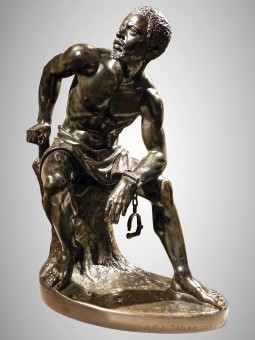How does one end moral evils like slavery, racism, or sexism?
First, by recognizing that culture is upstream from laws and policies, and worship–“cult” –is upstream from culture. We make societies like the God or gods we worship. A godless universe leaves people free to enslave others, objectify women, and kill the “unwanted” or those deemed unworthy of life. The same is true of a universe populated with pagan, capricious deities.
It is in the recognition of the moral God of the universe that we find that all men and women are made in the image of God and thus are fundamentally equal in dignity. Tied to this is their inherent moral nature; while we may not act morally because of the fall, we are equal in moral value. From this, the concept of deep respect for each human being, and its application of equal treatment under the law, is established.
The Bible, unlike other religious documents, declares that all human beings—male and female, young and old, sick and healthy, of every skin color—are made imago Dei (Gen. 1:26-28). The equal worth, dignity, and value of all humans are established at creation in the opening chapter of Genesis.
People will argue that slavery is permitted in the Scriptures. But on closer examination, we see that the Scriptures distinguish between God’s purposes, on the one hand, and reality in a fallen world, on the other. It distinguishes between God’s intended purpose and what he permits.
We are sinners to the core. Institutional evil is birthed out of moral evil (personal moral sin). An ideology that posits there is no God has no grounds for moral evil. Thus, people are free to do as they please. Might makes right.
Orderly God, ordered universe
So while the practice of slavery as a permitted evil is recorded in the Bible, it is clearly immoral by biblical standards. But before you can change behavior and laws you mus t first disciple at the level of culture. The culture must understand that an infinite, moral, personal God exists as the creator of the universe. His existence entails a moral and orderly universe. Human beings are made in the image of God, male and female, and we have a responsibility to govern creation.
t first disciple at the level of culture. The culture must understand that an infinite, moral, personal God exists as the creator of the universe. His existence entails a moral and orderly universe. Human beings are made in the image of God, male and female, and we have a responsibility to govern creation.
During most of human history, slavery has been seen as normal, often an economic “necessity” for the ruling class, and legal in virtually every society. The Bible has challenged this, at the most fundamental level, by affirming that all human beings are made imago Dei.
Two examples will suffice to illustrate this, one from the New Testament book of Philemon and one from the Old Testament book of Jeremiah.
Onesimus, the runaway slave
At the time of the New Testament, slavery was normal and legal in the Roman Empire. Eighty percent of inhabitants of the Roman Empire were slaves. In his letter to Philemon, a Christian slave owner, the Apostle Paul writes about a runaway slave named Onesimus.
Accordingly, though I am bold enough in Christ to command you to do what is required, yet for love’s sake I prefer to appeal to you—I, Paul, an old man and now a prisoner also for Christ Jesus—I appeal to you for my child, Onesimus, whose father I became in my imprisonment. (Formerly he was useless to you, but now he is indeed useful to you and to me.) I am sending him back to you, sending my very heart. I would have been glad to keep him with me, in order that he might serve me on your behalf during my imprisonment for the gospel, but I preferred to do nothing without your consent in order that your goodness might not be by compulsion but of your own accord. For this perhaps is why he was parted from you for a while, that you might have him back forever, no longer as a bondservant but more than a bondservant, as a beloved brother—especially to me, but how much more to you, both in the flesh and in the Lord.
So if you consider me your partner, receive him as you would receive me. (Philemon 8-17)
Evidently Paul had met Onesimus while in prison and Onesimus had become a follower of Christ under Paul’s ministry.
Treat him as a brother!
 So what did Paul say to Onesimus? “You are now free in Christ and a free man.” No, Paul sends Onesimus back to his master with a letter in which Paul said, in essence, “Onesimus left you as a slave and I send him back as a brother. Greet him as a brother in Christ and treat him as you would treat me, your brother!”
So what did Paul say to Onesimus? “You are now free in Christ and a free man.” No, Paul sends Onesimus back to his master with a letter in which Paul said, in essence, “Onesimus left you as a slave and I send him back as a brother. Greet him as a brother in Christ and treat him as you would treat me, your brother!”
Did Paul declare a legal end to slavery? Could he have done so? No, and no! He reiterated the biblical principle, the foundational moral concept that we are all made imago Dei. Before anything else, Onesimus and Philemon were children of God, they had one blood in their veins and thus were brothers. This truth effectively changed their relationship. More than that, it was ultimately responsible for establishing slavery as a moral evil worldwide; then it became illegal.
- Darrow Miller
… to be continued







2 Comments
Olusegun Owopetu
March 2, 2021 - 3:42 amMy takeaway from this post.
WE ARE SINNERS TO THE CORE – White, Black, Yellow or Red. True. There is a wise saying in my tribe that “Even though you are weeping but you can still see” No thief wants his goods to be stolen. Why? To that thief that is bad!!! Who taught him what is bad or good. As I reflect on the post, its implications as I ponder on the evils being perpetuated at the local level of my society – news coming from other frontiers are also disheartening. But the message of this post sheds light where humanity got it wrong and the true living God is giving to mankind that we have a choice to make.
“But before you can change behavior and laws you must first disciple at the level of culture.” Discipling the nations – starting from where we are becomes more imperative and added to this a strong biblical lifelong learning – continuously cultivating our minds. In this area, I want to see concerted efforts among Christ’s disciples labouring together and to see well established society where the LORD Jesus is welcomed. Thank you Brother Darrow Miller for this post.
admin
March 17, 2021 - 7:52 amThank you Olusegun. It is always good to hear from you.